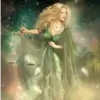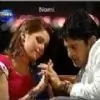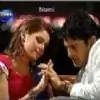One more famous story from Mahabharat. Yuddhisthira is tormented by losing the Kingdom and especially because he lost Draupadi in the gambling match and she was dragged to the Sabha. Brihadashva tells him something similar also happened in the past, when Nala got addicted to vice of gambling and had to lose everything.
Nala Damayanti
Damayanti is the daughter of King Bhima of Vidarbha and she was extremely beautiful. King Nala was King of Nishadhas and was son of Virasena. Both were told stories of each other and both started desiring each other. Nala becomes lovelorn and goes to a grove where he sees golden winged Swans. He grasped one of them and the Swan asked him not to kill him. If he does not, then he will go to Damayanti and talk about him. Nala agrees and Swan goes away
Damayanti is playing with her friends when they see lot of Golden winged Swans. Each of her friends tries to catch a Swan. Damayanti also gets hold of one. The Swan speaks to her in human language and tells her about Nala. She tells the Swan to give her message to Nala and the Swan agrees and flies away.
Damayanti becomes lovelorn after hearing about Nala. Her Father gets worried and thinks she should be married. He arranges a Swayamvar for her and invites all the Kings.
Sage Narad and Parvat go to Indralok and Indra asks them why all the Kings have not visited him. Narad tells him that they have all go to Swayamvara of Damayanti. He recounts how beautiful and all the qualities she possesses. Heating this Indra, along with all the Gods started for the Swayamvar. On the way they come across Nala, who is as beautiful as Kamadev. Nala is also going for Damayanti's Swayamvar. They descend from their Vimanas and address him. They ask him to become their messenger and he agrees. Lord Indra tells him that he should go to Damayanti and tell her that the Lord Indra along with Lord Yama, Lord Varuna and Lord Agni will be there and she should chose one of them. Since, Nala is going there for Damayanti, he tells them he cannot do that. But Lord Indra reminds him that he already promised them he will be their messenger. Then, Nala tells them that he cannot go there because there will be lot of guards and they wouldnt let him meet Damayanti. Lord Indra tell him that he would be able to do it, he should just go.
Nala enters the inner quarters without anyone seeing him or stopping him. The ladies are very surprised to see him. Damayanti is struck with wonder and asks him who he is. She tells him that she is struck by desire after seeing him and asks him how he entered the Palace. Nala tells her not to desire him since he just a mere mortal and she is coveted by the Immortals themselves. She should choose one of them at the ceremony. Damayanti tells him that she cannot choose anyone other than him. He should come with them at the ceremony and she will choose him in front of them so no sin will be attached to them. Nala goes back to the Gods and tells them what happened.
They arrive at the ceremony with other Kings. Everyone is enticed by Damayanti's beauty. She say saw five identical men looking like Nala. Then she prays to Indra, Agni, Yama and Varuna to bless her and show their true form to her. They answer her prayers and she is able to identify Nala. After she chooses him, they are delighted and give him 8 boons.
While the Immortals were returning, they see Kali and Dwapar travelling together. They ask them where they are going. Kali tells them that they are going for ceremony. Kali gets angry that Damayanti chose mortal like Nala over them. But the Gods tell him that she chose Nala with their blessing and left from there. Kali tells Dwapar he is angry and will punish Nala. He asks Dwapar to enter the dice and says that he will enter Nala to destroy him.
Kali goes to Kingdom of Nishadhas and waits for an opportunity to possess Nala. He waits for twelve years and finally gets an opportunity to enter Nala. Nala had done his evening ceremony without purifying himself when he doesnt wash his feet first. Then he goes to Pushkara and tells him to play dice with Nala, which he will win. Pushkara repeatedly asks Nala to play dice with him and Nala cannot deny. Nala gets addicted and loses everything. The citizens get worried for him but Nala doesnt heed anyone. This goes on for several months.
Damayanti gets worried and calls for Nala's charioteer Varshneya. She tells him to take Nala's best horses and yoke them to his chariot and take their twins to her father's capital and leave them there. Then he can either stay there or go wherever he pleases. Varshneya does as he is told and then goes to Ayodhya and joins the service of King Rituparna.
After losing everything, Pushkara asks Nala to stake Damayanti. Punyashloka(Nala) gets very angry and removes all jewellery and goes away from there in single cloth. Pushkara has it announced that anyone who supports Nala will be killed. Nala and Damayanti go out of city gates. There he sees some birds and tries to catch them. They take away his cloth and Nala is left naked. The birds tell him they are the dice who made him lose everything. Nala feels extremely miserable and asks Damayanti to return to her father, since he has nothing now. Damayanti refuses to leave him in this condition and ask him to join her. Nala says he cannot go to her father in this condition and bring her unhappiness. They both travel, thirsty and hungry, and come to a public dwelling house. They rest there on the ground but Nala cannot sleep. He looks at Damayanti, who slept off after being exhausted, and thinks he cannot continue wandering with her. He will leave her then may be she will go back to her relatives. He tears the garment between them in two and goes off from there.
Damayanti wakes up and is scared to find herself alone in the deserted forest. She calls for Nala but he is nowhere to be found. Then she gets attacked by a Boa constrictor. She starts shouting and a hunter hears her. He comes there and kills the Boa. He sees Damayanti who is very beautiful even in her pitiful state and asks about her. She tells him what happened. Hunter is struck by desire seeing her and Damayanti realises it. She curses the Hunter that if she has never thought about any man other than her husband, he will drop dead and the hunter dies.
Damayanti leaves from there looking for Nala. She curses the one who caused misery to Nala. She sees a tiger and asks him about Nala but the tiger just goes to drink water. Then she prays to Mountains to tell her about Nala. Then she comes across some hermitages and sees some Brahmanas there. She asks them about Nala. They tell her she will see him soon and vanish from there. Then she sees a Ashoka tree in the forest, and asks if it has seen her husband.
She keeps wandering through the forest and encounters a Caravan. She checks with them and gets to know they are merchants. She join them on their journey. At night, a herd of elephants attacks the Caravan and tramples them. Damayanti thinks because of her misfortune even the Caravan is getting punished. Then she asks the leader where they are heading, and they tell her that they are from Chedi and going there.
There she meets the King's mother and Damayanti tells her she is Sairandhri of noble birth. Rajmata asks her to stay with them. Damayanti says she will stay with them but will not eat left over food or wash anyone feet. Rajmata agrees and asks her daughter Sunanda to take Sairandhri with her.
While wandering in the forest, Nala comes across a fire and hears cries of help. He sees a Serpent coiled there. The Serpent tells him that his name is Karkota and he was cursed by an ascetic because of which he cannot move. He asks Nala to help so that he will help Nala come out of his misery. Karkota becomes small in form and Nala takes him out. Then the serpent asks Nala to keep walking and count. At tenth step, he bites Nala and instantly Nala's forms changes. He tells Nala he did this so that the one who resides in Nala's body will get tormented by his venom. Nala did not deserve the misery. He tells Nala that now no one will recognise him and he should gop to Ayodhya and in exhange for his skill with horses, King Rituparna will teach him skill with dice.
Nala introduces himself and Bahuka to King Rituparna and joins his service. He keeps thinking about Damayanti and recites a Shloka in her memory every night,
‘O ascetic! Hungry, thirsty, fatigued and miserable, where are you? Do you keep thinking about
that unfortunate one? Whom are you attached to now?’
On the other hand, King Bhima has sent out Brahmanas to search for Nala and Damayanti, promising thousand cows to anyone who finds out anything about them. A Brahmana named Sudeva recognises Damayanti and they talk. Sunanda sees Sairandhri crying after the Brahmana left and asks her mother to find out. Rajmata asks Sudeva to tell her about the lady. Sunanda and her mother find out that she is Damayanti, daighter of King Of Vidarbha and Wife of King of Nishadhas. Rajmata tells her that she is the sister of her mother and she was there when Damayanti was born in her father's house. Damayanti thanks her for taking care of her, without knowing anything about her and requests her to send her to Vidarbha.
After resting, Damayanti tells her mother that she cannot live without her husband and he needs to be found. Her mother informs this to her father who asks the Brahmanas to search for him throughout kingdoms. Damayanti tells them to recite the shloka wherever they go and see who reacts to it,
‘O gambler! O loved one! You are the one who sliced off half my garment. Where are you? You abandoned your beloved wife in a deserted region. It is in accordance with your instructions that she is still awaiting you, clad only in half a garment. The lady is tormented by grief. O lord of the earth! She repeatedly weeps because of that sorrow. O brave one! Show her your favour and reply to her words.’
Then, a Brahmana named Parnada tells her that he went to Ayodhya and recited her Shloka in public place in front of King Rituparna but no one reacted. But later, Bahuka came and talked to him. After hearing this, Damayanti tells her mother that without informing Bhima, they should send Sudeva to Ayodhya and tell there that Damayanti's Svayamvar is being arranged tomorrow. Hearing this King Rituparna asks Bahuka if they can reach Vidharbha in a day. Bahuka's heart get broken after hearing this. But he decides to help King Rituparna so that he can find out whats happening. They are accompanied by Varshneya. They come across a tree and Rituparna gives the counts of leaves and fruits of tree that are still on it are 101 more than the ones on ground. Bahuka insists on counting to know if its true. Rituparna tells him they are getting late. Bahuka tells him he will make sure to count, if he wants he cant take Varshneya and go ahead. Rituparna tells him, no one can chariot the horses like him so he lets Bahuka complete the counting. Bahuka gets surprised at King being right. King Rituparna tells him he has knowledge of dice. Bahuka asks him teach and he can give him knowledge of horses. Seeing that they are getting delayed, Rituparna tells him he will teach him about dice and his knowledge of horses can be done later. As soon as Nala learns about the knowledge of Dice, Kali emerges from his body. He keeps vomiting venom of Karkota. Nala wants to curse Kali but he asks for forgiveness saying his wife's curse and the venom both tormented him a lot. He gives a boon saying anyone who recites Nala's story will have no fear from Kali. This encounter is not seen by others.
They reach Vidarbha and are surprised to see no festivities related to Swayamvar. King Bhima is surprised to see King Rituparna there but Rituparna keeps quiet thinking there has been a misunderstanding. Damayanti had heard the chariots roaring and thought of Nala. But then, she could not recognize him as Bahuka. She sends her messenger Keshni and asked her to find out about the person who was driving the chariot. From whatever Keshni tells her, Damyanti deduces its Nala. She then asks Keshni to bring meat that Nala has cooked. From the taste she knows its Nala himself. She then tells her mother that she has to meet Nala and then her mother tells this to King Bhima, who sanctions them to mett at her place.
Damayanti then asks Nala why he abandoned her. He tells her he was tormented by Kali and he could not do anything about it. He asks her why she decided to marry once again. Damayanti tells him she had no suite idea, she only wanted to bring him to Vidarbha. The Wind God announces that Damayanti was right and she has never done any bad conduct. They protected her for 3 years and now Nala should unite with his wife. Then Nala adorned the never decaying garments and thought of Karkota, which changed him back to his original form. Everyone was happy for Nala and Damayanti. King Rituparna asks NAla to forgive him of he made any mistakes while he was staying with them. Nala tells him they are friends now and gives him knowledge about horses.
Nala and Damayanto go back to Nishadha and Nala asks Pushkara for restake with whatever they had and their life. Thinking he is going to win, Pushkara agrees stating that will win Damayanti, who he desires. Nala is angry but proceeds with the gamble. He wins everything back. He tells Pushkara that he won because of Kali and he forgives him. Then Nala calls back Damayanti and his children from Vidarbha and they live happily ever after.
Edited by devashree_h - 2 years ago



























